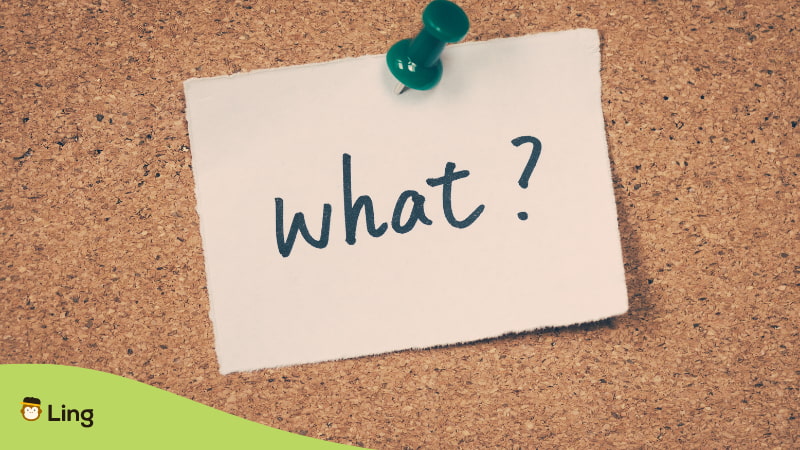Learning Italian on your own? Then you should also try the basics. There are many ways to learn Italian. Through reading, speaking, listening, or writing exercises, there are tons of lessons to check. But where should you first start? Let’s go with the easy sentences, phrases, and words.
Would you like to know how what are the easy Italian question words? Question words are used at the beginning of a sentence when you want to ask something. For example, the most common question words are:
- Who
- What
- How
- When
- Which
- Why
- How much
- How Many
The question words are fundamental in learning Italian because you will definitely need them during your travel to Italy. Or even with your Italian friends since you will ask some questions occasionally.
This article covers the most common Italian question words you will need.

What Are The Italian Question Words?
Question words help you ask for information about various things you might need. For example, you can ask what time it is, directions, the price of an object, other people’s preferences, and much more.
Here are the easiest Italian question words to learn:
1. QUANDO (WHEN)
“Quando” has the function of asking, in interrogative sentences, at what time or the moment a fact, a situation, or an action will be determined.
Here are some examples:
2. PERCHÉ (WHY)
This word means for “what reason?.” It is used in direct and indirect interrogative propositions to ask the cause or purpose for which something has been done.
Here are some examples:
3. CHI/DI CHI (WHO/WHOSE)
The word “chi” can be masculine and, more rarely, feminine and means “the one who…,” while the word “di chi” is used to ask others about the ownership of things.
The following examples can help you figure out how to use this word:

4. CHE/CHE COSA/COSA (WHAT)
All three forms of the so-called ‘neutral’ interrogative pronoun are correct and widely used in contemporary Italian in direct and indirect interrogative propositions.
- Che (cosa / che cosa) mi volevi dire? – What did you want to tell me?
- Non mi ricordo più di che (di cosa / di che cosa) ti volevo parlare – I no longer remember what I wanted to talk to you about
“Cosa” appears to be the most common form today at all levels of writing and speaking. But it has by no means undermined the more traditional “che” and “che cosa” from use.
The form that became established later in the history of Italian was precisely “cosa” considered by grammarians to be a form to be avoided.
The fortune of “cosa” began in the mid-nineteenth century when Manzoni (following the model of the Florentine spoken by educated people) decided to correct “cosa” instead of “che cosa” used in the first edition of the Promessi Sposi (The Betrothed).
Here are some examples of use:
| Italian | English | Pronunciation |
|---|---|---|
| Che giorno è oggi? | What day is today? | |
| Che cos’è quello? | What is that? | |
| Che fai? | What are you doing? | |
| Che ore sono? / Che ora è? | What time is it? | |
| Che cosa vuoi? | What do you want? |
5. QUANTO/QUANTI/QUANTE (HOW MUCH)
This is another question word used in interrogative and doubtful sentences to ask for the quantity or number of things or people.
Here are some examples:
6. QUALE/QUALI (WHICH)
This word indicates, with an interrogative and relative value, single elements (things, people, animals, etc.), or categories of factors, about the quality they are characterized and distinguished.
For example:

7. DOVE/DA DOVE (WHERE)
This word means “in what place:” For direct or indirect interrogative sentences, it indicates state or destination.
For example:
| Italian | English | Pronunciation |
|---|---|---|
| Da dove vieni? | Where are you from? | |
| Dove abiti? | Where do you live? | |
| Dove si trova il comune? | Where is the municipality located? |
Would you like to learn more about the Italian language?
Ready To Learn More Italian? Use The Ling App!
Now that you know how to ask questions in Italian, what about becoming fluent? If you want to speak like a native, you can use the Ling app!
With this application, you can learn Italian quickly by following lessons at your own pace. Or you can learn more than one language if you want. Moreover, understanding every aspect of a language, like grammar, pronunciation, and other language aspects, is possible.
In addition, if you want to understand all shades of a mother tongue, you can check out our posts on Country Names And Nationalities In Italian and Happy Birthday In Italian. Get ready to add even more words to your vocabulary!
If you want to learn on the go, no problem. Ling is available on all mobile devices.
What are you waiting for? Discover the language learning app from the App Store or Google Play for free today and do a trial lesson!
































































